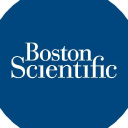Boston Scientific: Strong Performance Data For New IC Products
Global medical device maker Boston Scientific (NYSE:BSX) recently reported a strong set of trial and performance data for its SYNERGY stent and Lotus Transcatheter Aortic Valve (TAVR) systems, from independent studies. Both products are part of the company’s Interventional Cardiology (IC) division, and contribute to the sales of its Drug-Eluting Stents (DES) and Structural Heart businesses, respectively. In the past few years, IC sales have declined rapidly owing to macroeconomic headwinds and increasing competition. However, the business is turning around on account of improving economic conditions and growing acceptance of new products. In the first quarter this year, IC sales grew by a modest 1% year-over-year on a constant currency basis, to about $500 million. [1] [2] [3]
SYNERGY is a next-generation DES that dissolves inside the body within three months. It received CE approval in Europe in Q4 2012 and has shown impressive uptake despite its premium price. On the other hand, Lotus TAVR device is used to replace impaired heart valves (aortic stenosis) in patients who are too weak for traditional open heart surgery. Boston Scientific received CE approval for this device in Q4 2013 and reported solid growth in its first quarter this year. The company expects to start IDE trials for the device in the U.S. in the second half of 2014. [4]
We expect the strong performance data for both devices to aid their acceptance in international markets and drive IC sales growth going forward. The products currently driving sales in the IC division include the Promus PREMIER DES system and the anti-stroke Watchman device.
- Should You Pick Boston Scientific Stock After A Solid Q4 And 13% Uptick This Year?
- What’s Next For Boston Scientific Stock After 5% Gains In A Week?
- Should You Pick MGM Resorts Over Boston Scientific Stock For Better Returns?
- Which Is A Better Buy – Boston Scientific Stock Or Abbott?
- What’s Next For Boston Scientific Stock After Outperforming During The 2022 Inflation Shock?
- New Product Launches To Aid Boston Scientific’s Q1
We have a price estimate of $13 for Boston Scientific, which is slightly below the current market price.
See our full analysis for Boston Scientific
SYNERGY Trial Data
The aforementioned SYNERGY study data refers to the three-year follow-up data of Boston Scientific’s EVOLVE clinical trial, which the company presented at EuroPCR 2014 last week. The trial compared the SYNERGY bioabsorbable stent system with the PROMUS DES system in terms of safety as well as performance. The EVOLVE trial follow-up data was promising in both respects and also supported the idea that the bioabsorbable polymer stent technology could result in better healing than DES. ((ref:1))
The SYNERGY stent system uses an ultra-thin polymer coating which reduces long-term polymer exposure of the patient, according to the company. This helps in faster vessel healing and reduces the possibility of restenosis – a common adverse effect of such procedures resulting in the narrowing of blood vessels.
The company has already completed enrollments for the next stage of the EVOLVE trials, called EVOLVE II. EVOLVE II is the pivotal trial designed for gaining approvals for SYNERGY in the U.S. and Japan. It is going to be a randomized and controlled clinical trial with 1684 patients from 125 sites globally. The company expects to complete the trial within 12 months. [5]
Lotus TAVR Trial Data
The Lotus TAVR study refers to Boston Scientific’s REPRISE II clinical trial which is a prospective single-arm study with 120 patients in four countries- Australia, France, Germany and the UK. In a single-arm study, all patients enrolled in the study are treated with the device. Thus, there is no provision in the study to compare the treated patients with those who did not receive such a treatment.
The Lotus TAVR system reported strong performance results in terms of safety and efficacy at six months, according to the company. [2] The study focused on symptomatic patients with severe aortic valve stenosis, who were considered at high-risk for surgery. According to the study, 79.8% of the patients did not report any paravalvular aortic regurgitation at the end of six months. Moreover, there were no cases of severe paravalvular aortic regurgitation in the study period. The all-cause mortality rate was 8.4% and the disabling stroke rate was 3.4%.
This is significantly better than results reported for patients who do not receive treatment. According to a 2012 study, the average survival rate of patients with aortic stenosis was only 25%, at 3 years without surgery. It further states that 8-34% of patients with aortic stenosis symptoms die suddenly. [6] Aortic stenosis affects around 3% of the global population above 65 years and 5% of the population above 75 years. [2]
Boston Scientific extended its REPRISE II trial to an additional 130 patients last year and only recently completed the enrollment of patients. We will keep an eye for more updates on the trial.
See More at Trefis | View Interactive Institutional Research (Powered by Trefis)
Get Trefis Technology
- Press release, Boston Scientific, May 21 2014 [↩]
- Press release, Boston Scientific, May 21 2014 [↩] [↩] [↩]
- Boston Scientific Corporation’s CEO Discusses Q1 2014 Results – Earnings Call Transcript, Seeking Alpha, April 29, 2014 [↩]
- Lotus Valve Clinical Programme, Boston Scientific, 2014 [↩]
- SYNERGY Stent Clinical Trials, Boston Scientific, 2014 [↩]
- Aortic stenosis: Who should undergo surgery, transcatheter valve replacement?, CCJM, 2012 [↩]
